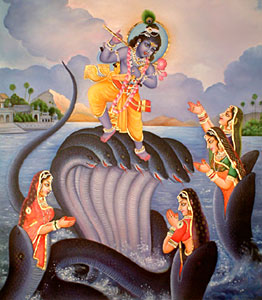 Kaliya is a mythological character who was the five headed serpent king. Kaliya resided in Yamuna River with several other snakes. His mouths vomited fire and smoke and his venom has poisoned the river.
Kaliya is a mythological character who was the five headed serpent king. Kaliya resided in Yamuna River with several other snakes. His mouths vomited fire and smoke and his venom has poisoned the river.
When Lord Krishna was a child he used to play with his friends near the River Yamuna. One day while playing their ball falls into the river. Krishna jumped into the river where Kaliya with the other snakes dwelt. Krishna was severely bitten by Kaliya.
Krishna`s companions and friends were horrified but Balarama called upon him to exercise his divine power. Krishna exercised his celestial prowess and with his celestial vigor bruised the head of the venomous and powerful snake. Krishna placed his foot on the middle head of Kaliya and compelled Kaliya and other snakes to implore mercy. Krishna freed Kaliya and his followers when they promised to leave the earth from their presence.
It is said that Asura Kalanemi lived within Kaliya.
This article is a stub. You can enrich by adding more information to it. Send your Write Up to content@indianetzone.com




















